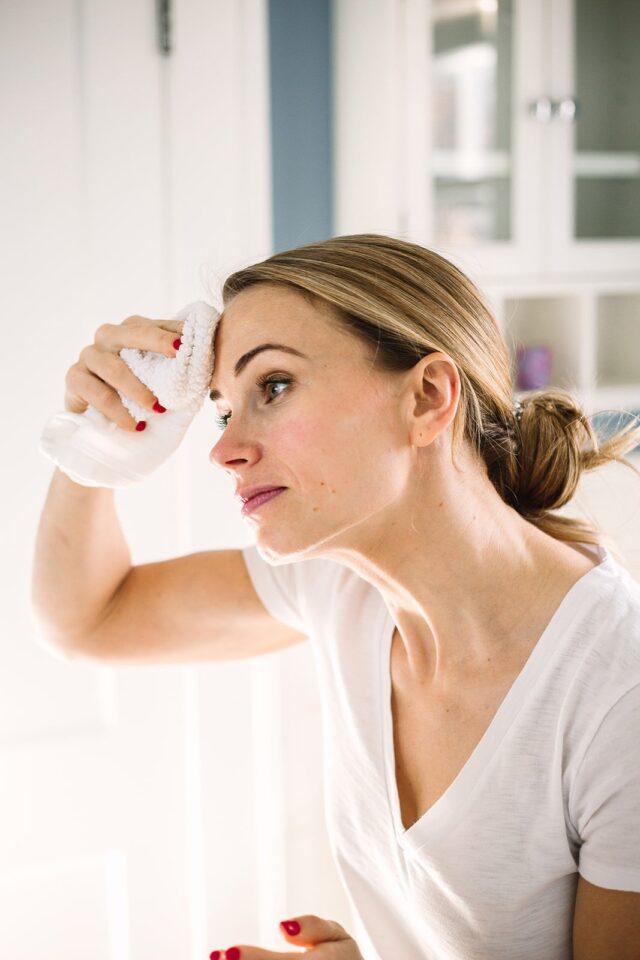

Wondering what skin care products to avoid in pregnancy or what can help with melasma, breakouts and dullness? Read this post for more information about my pregnancy skincare routine to help you make the right decisions for you.
I’ve been really blessed to not experience many issues with my skin during pregnancy, either time. I was worried about the common issue with hormonal acne since I used to have HORRIBLE acne in my mid to late 20s, but the worst I’ve had is an occasional breakout and some dryness. This pregnancy is slightly different from my first because the the weather is drier and colder than it was when I was pregnant with Thomas, so my skin is drier this go round, but still, nothing serious. And I give a LOT of credit to having a good skincare routine in place long before I got pregnant.
Because I’m quite the skincare junkie, and because I’ve talked about my pregnancy a lot on Instagram, I’ve been asked a lot if I changed my skincare routine. I’ve also been asked if I stopped using any products while pregnant, but I’ve kept everything exactly the same except for one or two serums. Since the majority of my skincare is Beautycounter, I know they’ve done rigorous research and testing of ingredients to ensure their products are safe. And they specifically evaluate how they impact vulnerable populations like pregnant or nursing moms.
When I got pregnant with Thomas 4 years ago, my doctor sent me home with a handout of products and ingredients to stop using. I was thankful I didn’t worry about anything I used! (When I got pregnant with baby #2, I knew there were only a few products I’d need to stop using, including a great retinol oil from Colleen Rothschild).
But, I know getting pregnant and getting that handout is how a lot of women first start to learn about some of the potential negative side effects of products they are using. And doing that research may have led you here. So, I hope this post is helpful so you have more information about what to look for in your skincare products and what you may want to ask your doctor. (If you’re looking for safe beauty products, you can see my makeup routine here.)
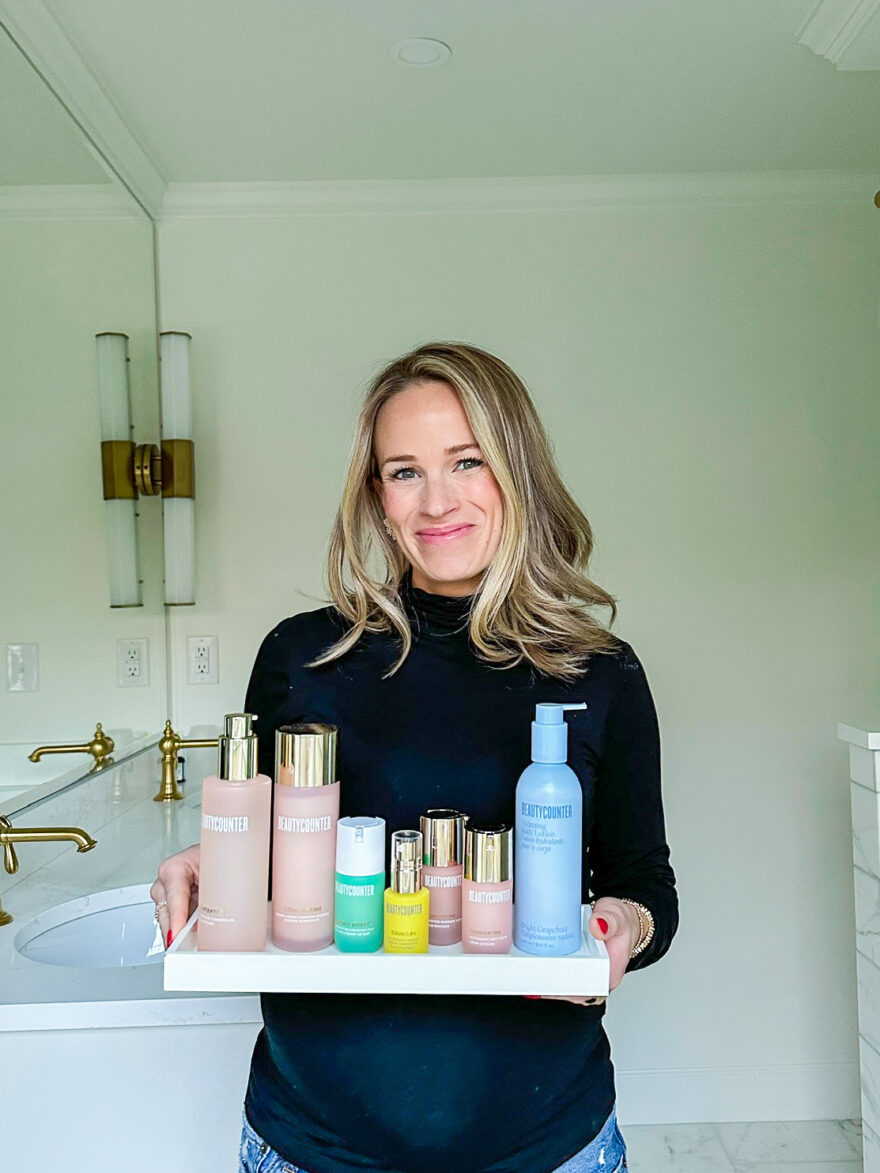
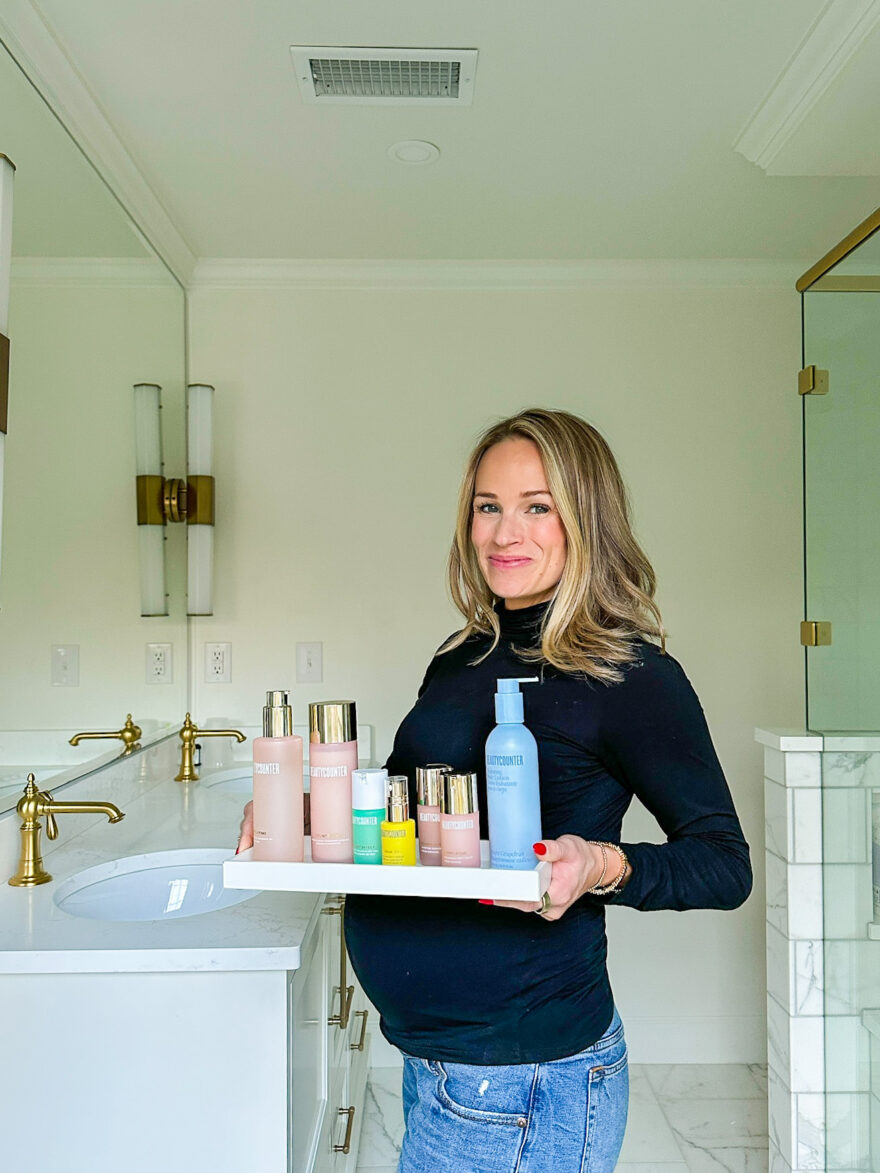
Yes. Every single Beautycounter product is screened for 23 health and environmental endpoints, including reproductive toxicity. Not only that, but Beautycounter is famous for their Never List, which is comprised of 2,800 ingredients questionable or harmful chemicals that they never use as ingredients in their products.
This includes the nearly 1,700 chemicals banned or restricted in personal care products by the European Union, plus additional chemicals screened by Beautycounter and found to be of concern. are not allowed in their products. It says a lot of that there are more than 1,000 other ingredients Beautycounter won’t use, considering the EU is pretty stringent. Beautycounter is one of the best clean beauty brands on the market because they are rigorous with testing but the performance is still SO good.
At Beautycounter, we craft all of our products with safety in mind, especially for those who might be extra vulnerable – like pregnant women and babies. We carefully screen and assess each of our ingredients for 23 distinct, safety endpoints, including reproductive toxicity. That said, as pregnancy affects everyone differently, check with your doctor before beginning the use of any products if pregnant, nursing, or planning to become pregnant.
If you want to do a deep dive on ingredients and their safety during pregnancy, this blog post from To Make a Mommy is very helpful.
The moral of the story is that every pregnancy is different, every doctor is different and every woman’s comfort level with various things in pregnancy is different. And that’s true for everything, not just skincare.
For example, Beautycounter’s Overnight Resurfacing Peel contains glycolic acid and this Beautycounter SOS Spot Treatment contains 2% salicylic acid. I’m comfortable using both of those since I know the rigorous testing that Beautycounter does on the safety of their products, with special consideration for the concentration of ingredients for those who are pregnant.
But, you may not be comfortable using those. And I’m sure there are things you use that I wouldn’t. So again, you have to do what’s right for you! Educate yourself and go with your gut.
The hard thing about pregnancy and data is that it’s hard to do really thorough studies because it’d be an ethical issue to subject certain women to potentially harmful ingredients. That applies to skincare, diet, drinks, everything. For example, some doctors will say a sip of alcohol here and there is fine and others say absolutely don’t touch a drop.
The same applies to skincare and specific ingredients. Some doctors will say certain ingredients are fine, while others take a more conservative approach. However, Beautycounter’s standards INCREDIBLY high, so there’s no guesswork involved. You can feel good about every single product they carry– from body butter to blush and even mascara.
Remember, every pregnancy is different. There may be additional products or ingredients that your doctor tells you to avoid so if you have questions, check with your OBGYN.
Below are ingredients that are typically recommended to be avoided while pregnant, and I’m going to share which Beautycounter products I use instead.
All of these are vitamin A derivatives and may lead to birth defects. Most doctors will tell you to stop using those because of the harmful side effects. I used retinol for years before switching to the Overnight Resurfacing Peel came out. It’s a safer alternative to a retinol product with similar results, and it drastically improved my skin texture.
Accutane and Tazorac can both cause major birth defects if used while pregnant. Generally doctors will require a pregnancy test before they prescribe Accutane and will often require you to take them throughout your course of Accutane. I believe they do the same for Tazorac too. (I’ve never personally used either.)
Hydroquinone is an ingredient used to brighten skin. It’s often used to address melasma or skin spots. While some say it doesn’t have negative impacts, it is known to have a higher absorption rate than other types of ingredients. That means it could eventually make its way into your blood stream and affect your baby. Talk to your doctor about the risk and benefit for your situation. However, Beautycounter’s All Bright C serum is safe for use during pregnancy. My post about the Beautycounter Vitamin C serum goes into detail on its ingredients and benefits.
Most conventional sunscreens use a chemical based sun protection like oxybenzone or avobenzone. These may cause hormone disruption and/or interfere with your baby’s nervous system development. (They also damage coral reef and are banned in Hawaii.)
I switched to non-nano zinc oxide mineral sunscreen years ago and haven’t looked back. This post has lots of non-toxic sunscreen options I like. (Beautycounter’s sunscreen even made the cut in a Women’s Health article about safe sunscreens.)
There are LOTS of opinions on this without a clear answer. Definitely talk to your doctor about your situation.
Acne during pregnancy is common. Benzoyl peroxide and salicylic acid are the most common treatments for acne. But, those ingredients are controversial when used during pregnancy.
If you do use salicylic acid, most doctors will recommend that you use products no stronger than 2%. (All of Beautycounter’s acne products contain 2% or less.) When applied topically, Benzoyl Peroxide is believed to be safe during pregnancy, but some people still have concerns. So check with your doctor regarding your situation on both ingredients.
If you’re struggling with breakouts, be sure to read this post with more tips for clear skin.
This is yet another ingredient that’s highly debated. While it’s only supposed to penetrate to the top layer of skin (i.e. doesn’t absorb into your bloodstream or make it to your baby), some medical professionals advise to stay away out of an abundance of caution.
Note that this is different from hyaluronic acid, which is safe for pregnancy.
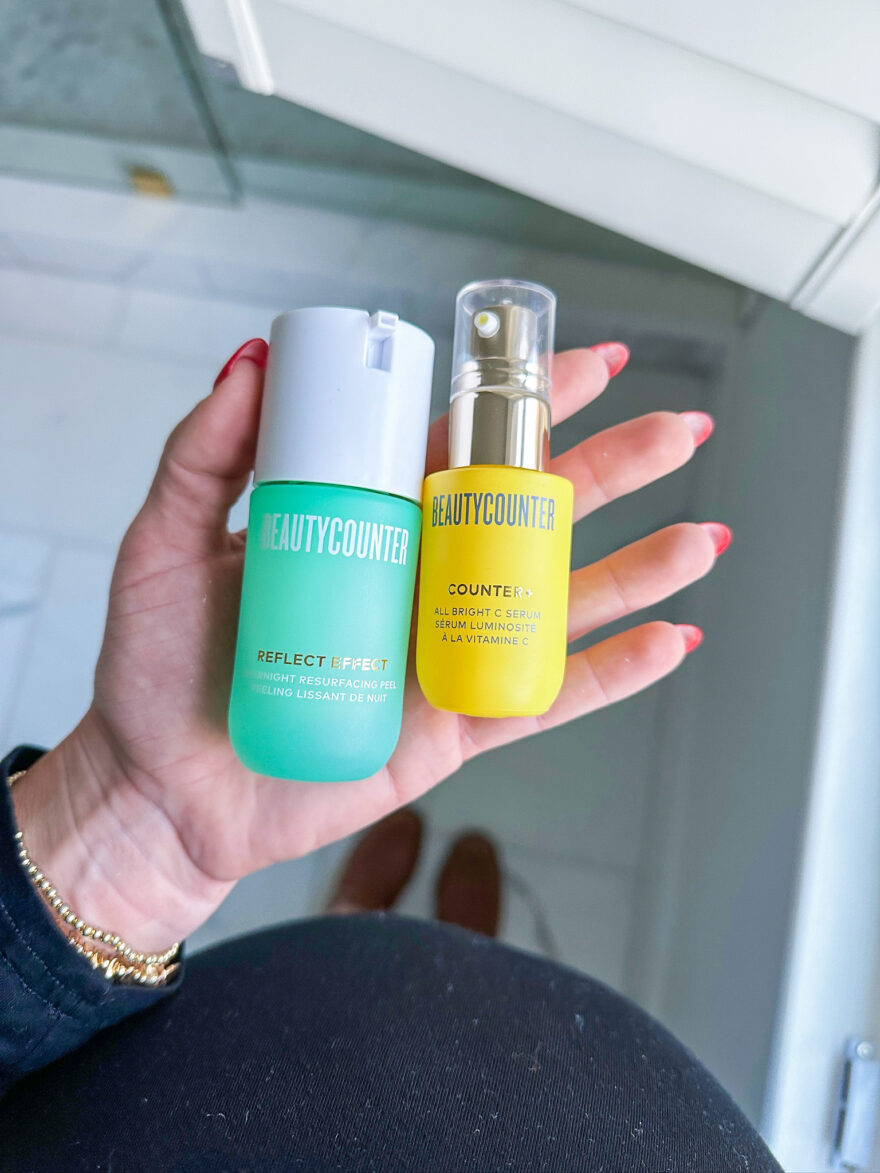
Here’s what I currently use.
Countertime Lipid Defense Cleansing Oil or Countermatch Foaming Face Wash – I like having a non-glass option to keep in the shower, which is why I sometimes use the Countermatch lotion. Both are hydrating options that don’t leave a heavy film on my face.
Mineral Boost Hydrating Essence – this helps balance my skin after cleansing so it’s not too try and helps the products that follow absorb better
All Bright C Serum – this brightens skin and helps prevent and address melasma, which is common in pregnancy. (Read my review of this Vitamin C Serum here.)
Tripeptide Radiance Serum – this helps tighten and firm skin and improve hydration.
Antioxidant Soft Cream – this day time moisturizer helps prevent fine lines and also provides ample hydration without causing makeup to pill.
Ultra Renewal Eye Cream – the ONLY eye cream I’ve ever liked. Amazing for dark circles, puffiness and fine lines.
Cleanser
Countertime Lipid Defense Cleansing Oil or Colleen Rothschild Cleansing Balm – I LOVE the cleansing balm but it’s too heavy for daytime for me. So I often use this at night, alternating with the Cleansing Oil. Both are very hydrating! (This post explains why I prefer the Colleen Rothschild Cleansing Balm over the Beautycounter Cleansing Balm.)
Mineral Boost Hydrating Essence – same prep step as my morning routine
Tripeptide Radiance Serum – same prep step as my morning routine
Overnight Resurfacing Peel – I use this 2-3 times a week in place of the Tripeptide Serum to help with skin spots, large pores and fine lines. (Read my review of the Overnight Resurfacing Peel here.)
SOS spot treatment & Charcoal Mask (as needed) – I get occasional breakouts around my nose and use these to dry them up.
Countertime Tetrapeptide Supreme Night Cream – I CANNOT LIVE WITHOUT THIS. It’s amazing for dry skin! It’s incredibly thick, but absorbs quickly without a greasy finish. A little goes a long way too, so it lasts forever.
No. 9 Oil – On the nights that I’m not using the peel, I use and love this hydrating oil. It’s silky and not greasy. Beautycounter’s Brightening Oil is another great option but I do find it’s a bit heavier than the Colleen Rothschild one.
I hope this helps you figure out a solid pregnancy skincare routine. As with everything I share on my blog about pregnancy, I’m sharing my personal experience. Talk to your doctor, be your own advocate and go with your gut on any decisions you make throughout your pregnancy.
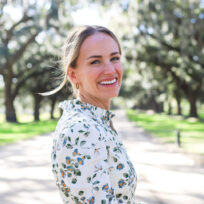

Leave a Comment
2 responses to “Is Beautycounter Pregnancy Safe?”
I’m 13 weeks pregnant and have been so happy to not have to change my skincare routine because I use Beautycounter products!
Congrats on your pregnancy!!! And yes, it’s so nice to not worry about skincare when there are so many other things to think about during pregnancy!! 🙂